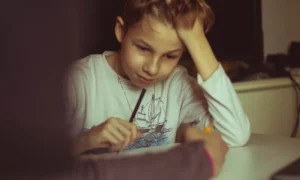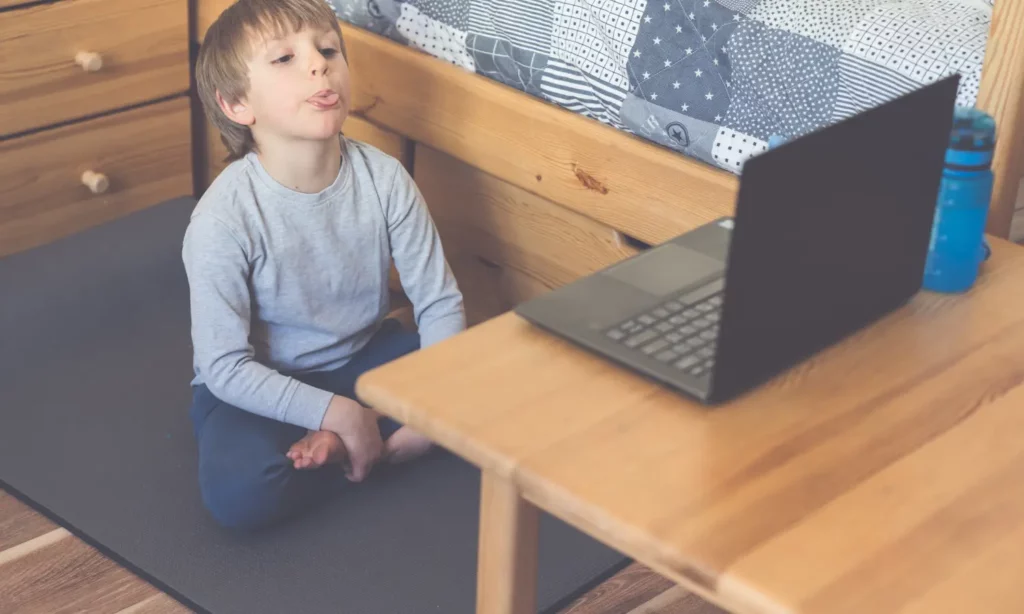Are you a parent navigating the challenges and joys of raising a child? In the rollercoaster of parenthood, we often encounter moments where our kids may need a little extra support be it academic stress, social anxiety, or simply navigating the complexities of growing up. That’s where online therapy for kids, also known as teletherapy or e-therapy, steps in as a beacon of assistance.
So, if you’ve ever wondered about the benefits of online therapy, how it works, or where to start, you’re in the right place. Let’s embark on this journey together, discovering the transformative potential of online therapy for your child. Get ready to explore, learn, and pave the way for your child’s brighter and happier future—right from the heart of your home.
Contents
- 1 Signs That Your Kid Might Need Therapy
- 2 How Therapy Can Help Your Child?
- 3 Some Types of Online Therapy for Kids
- 3.1 Cognitive-Behavioral Therapy (CBT)
- 3.2 Play Therapy
- 3.3 Art Therapy
- 3.4 Mindfulness and Relaxation Techniques
- 3.5 Narrative Therapy
- 3.6 Social Skills Training
- 3.7 Parent-Child Interaction Therapy (PCIT)
- 3.8 Solution-Focused Brief Therapy (SFBT)
- 3.9 Narrative Storytelling and Metaphor Therapy
- 3.10 Exposure Therapy
- 4 Benefits of Online Therapy for Kids
- 5 Challenges That You Might Face in Online Therapy
- 6 Conclusion
Signs That Your Kid Might Need Therapy
 Recognizing the signs that your child may benefit from therapy is crucial for their overall well-being. Keep an eye out for these indicators, as they could be signals that your child might need additional support:
Recognizing the signs that your child may benefit from therapy is crucial for their overall well-being. Keep an eye out for these indicators, as they could be signals that your child might need additional support:
- Persistent Behavioral Changes: Sudden and lasting shifts in behavior, such as aggression, withdrawal, or mood swings.
- Academic Struggles: A noticeable decline in academic performance or an unexplained reluctance to attend school.
- Difficulty Managing Emotions: Persistent difficulty expressing or managing emotions, leading to frequent outbursts or meltdowns.
- Social Isolation: A sudden withdrawal from social activities or difficulty making and maintaining friendships.
- Sleep Disturbances: Significant changes in sleep patterns, such as insomnia or excessive sleeping.
- Traumatic Events: Exposure to traumatic events, such as loss, divorce, or accidents, impacting emotional well-being.
- Physical Symptoms: Unexplained physical complaints like headaches or stomachaches without a medical cause.
- Regression: Reverting to behaviors typical of a younger age, especially in response to stressors.
- Excessive Worry or Fear: Persistent and overwhelming worries or fears that interfere with daily activities.
- Change in Eating Habits: Noticeable changes in eating habits, whether it’s a significant increase or decrease.
If you observe these signs in your child, it may be an indication that seeking therapy could provide valuable support for their mental and emotional well-being.
How Therapy Can Help Your Child?

Embarking on the journey of therapy for your child is a proactive and compassionate choice. Here are compelling reasons how seeking therapeutic support is beneficial for your child’s overall well-being:
- Early Intervention: Addressing challenges early helps prevent them from escalating, promoting healthier development.
- Academic Stress: Therapy equips children with coping mechanisms, easing the burden of academic pressures.
- Social Development: Enhances social skills, fostering positive interactions with peers and reducing social anxiety.
- Emotional Regulation: Teaches kids to express and manage emotions effectively, promoting emotional well-being.
- Behavioral Concerns: Addresses behavioral issues, helping children develop positive habits and coping strategies.
- Family Transitions: Supports kids during significant life changes like divorce, relocation, or loss.
- Communication Skills: Improves communication, aiding in expressing thoughts and feelings constructively.
- Self-Esteem Boost: Builds confidence by encouraging self-reflection and a positive self-image.
- Trauma Recovery: Assists in processing and overcoming traumatic experiences for long-term emotional health.
- Parent-Child Dynamics: Enhances understanding and communication between parents and children.
- Mental Health Awareness: Fosters a healthy attitude towards mental well-being, reducing stigma.


 Discovering the world of virtual therapy for your child comes with a multitude of advantages, making it a valuable avenue for their mental and emotional well-being. Here are the compelling benefits of opting for online therapy:
Discovering the world of virtual therapy for your child comes with a multitude of advantages, making it a valuable avenue for their mental and emotional well-being. Here are the compelling benefits of opting for online therapy: While online therapy for kids comes with numerous benefits, it’s essential to acknowledge potential challenges that parents and children may encounter. Understanding these hurdles can help navigate the online therapy journey more effectively. Here are some challenges to be aware of:
While online therapy for kids comes with numerous benefits, it’s essential to acknowledge potential challenges that parents and children may encounter. Understanding these hurdles can help navigate the online therapy journey more effectively. Here are some challenges to be aware of:
